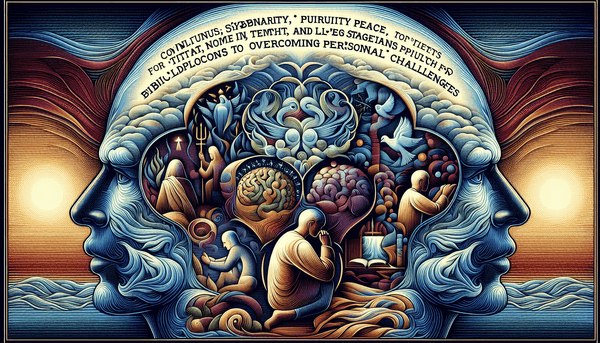The Ave Maria: A Marian Devotion
The Ave Maria, or Hail Mary, stands as a beacon of Marian devotion, tracing its origins to the angel Gabriel's greeting to the Virgin Mary in Luke 1:28, 'Hail, thou that art highly favoured, the Lord is with thee: blessed art thou among women.' This prayer encapsulates reverence and supplication, with believers seeking Mary's intercession. The second part of the prayer reflects Elizabeth's exaltation of Mary in Luke 1:42 and culminates in a petition for Mary to pray for us 'now and at the hour of our death.' Mary's role as a spiritual mother and intercessor is further illuminated in John 19:26-27, and her exalted status is symbolized in Revelation 12:1. The Ave Maria is not merely a prayer but a profound meditation on the mystery of the Incarnation, inviting us to ponder, as Mary did in her heart (Luke 2:19), the depth of God's love manifested in Jesus Christ.
The Jesus Prayer: Contemplation and Connection
Originating from the Eastern Christian tradition, the Jesus Prayer serves as a spiritual lifeline, drawing the believer into the presence of Christ with the simple yet profound plea: 'Lord Jesus Christ, Son of God, have mercy on me, a sinner.' This echoes the humility and dependence on God's mercy as shown by the tax collector in Luke 18:13. Through its repetitive invocation, the Jesus Prayer aligns the rhythm of our breath with the heartbeat of faith, embedding the recognition of Christ's divinity and our own need for forgiveness into our very being. It resonates with the call to 'pray without ceasing' found in 1 Thessalonians 5:17, and embodies the spirit of repentance and longing for God's grace as expressed in Psalm 51:1. This meditative prayer practice encourages a continuous, conscious turning towards God, fostering a deep sense of peace and spiritual intimacy.
The Apostles' Creed: Affirming the Christian Faith
The Apostles' Creed serves as a unifying declaration of Christian beliefs, a succinct summary of the Gospel's core tenets. Reciting the Creed, believers join in a chorus of faith that transcends time and space, echoing Peter's foundational confession in Matthew 16:16, 'Thou art the Christ, the Son of the living God.' The Creed outlines the story of redemption, from God the Father's creation, through Jesus' life, death, and resurrection—mirroring the early Christian proclamation in 1 Corinthians 15:3-4—to the ongoing work of the Holy Spirit in the Church and the world. It stands as a testament to the unity of the Church as described in Ephesians 4:4-6, and affirms the divine inspiration of the Scriptures as upheld in 2 Timothy 3:16. In reciting the Apostles' Creed, we are reminded of our shared heritage and the enduring truths that anchor our faith. For deeper exploration into these enduring truths and their relevance today, consider reading our article on biblical teachings and symbols.
Biblical Wisdom for Difficult Times
In life's tumultuous seasons, the Scriptures provide a wellspring of solace and strength. Prayer becomes the voice of our struggles, and the Bible offers the reassuring response. In moments of anxiety, we are guided by Philippians 4:6-7 to present our requests to God, with the promise of peace to guard our hearts. The prophet Isaiah reminds us that we are not forsaken, for God tells us, 'Fear not; for I am with thee' (Isaiah 41:10). This assurance is echoed in the Psalms, where we are assured that God is our refuge and strength, an ever-present help in trouble (Psalm 46:1). As we navigate hardships, the Apostle Paul's words in 2 Corinthians 4:8-9 resonate deeply, reminding us that we are 'perplexed, but not in despair.' And in the testing of our faith, we find joy and perseverance, as James encourages us to consider trials a cause for joy, knowing that the testing of our faith produces perseverance (James 1:2-4).
Conclusion
Prayer is the soul's sincere dialogue with the Almighty, a haven amid life's storms and a beacon in times of tranquility. Through the Ave Maria, the Jesus Prayer, and the Apostles' Creed, we are invited to engage intimately with our faith, drawing closer to the divine mysteries we profess. These prayers and affirmations connect us with a lineage of believers who have found solace, strength, and unity in their words. As we conclude, may we carry with us the richness of these spiritual practices, allowing them to shape our daily lives and deepen our relationship with God. We stand encouraged to share our experiences and insights on prayer and faith, fostering a community of believers united in devotion and love for the One who first loved us. For further reflection on the sacred texts and their teachings, consider exploring our discussion on biblical perspectives that enrich our understanding of faith, integrity, and divine purpose.
FAQ
Q: What is the significance of the Ave Maria in the Catholic faith?
A: The Ave Maria is a prayer of great importance in the Catholic faith, expressing reverence for Mary and seeking her intercession. It is often recited in personal prayer, during the Rosary, and in the Angelus prayer.
Q: How can the Jesus Prayer be incorporated into daily life?
A: The Jesus Prayer can be woven into daily life through repetition in quiet meditation, during moments of stillness, or aligned with one's breath, fostering a continual awareness of God's presence.
Q: What are the core beliefs stated in the Apostles' Creed?
A: The Apostles' Creed affirms belief in the Holy Trinity, the life, death, and resurrection of Jesus Christ, the work of the Holy Spirit, the holy catholic Church, the communion of saints, the forgiveness of sins, the resurrection of the body, and life everlasting.
Q: Why is nighttime prayer considered beneficial?
A: Nighttime prayer is a practice that can bring peace, closure to the day's events, and an opportunity to reflect on God's faithfulness, leading to restful sleep and spiritual renewal.






